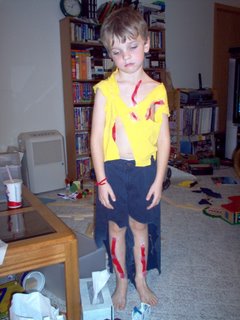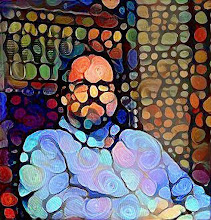Just over a week ago I went to see a play at a local university. I had intended to write about the play that evening when I came home, but in the time since then I haven't been able to come to any real conclusions as to my own reactions over the play. I've thought about the play quite a bit since seeing it, which would usually indicate that it struck me, somehow, in a positive way, but I don't think that's true. It is this dilemma which has haunted me.
The play was
O, Jerusalem, by A.R. Gurney. For those who aren't familiar with Gurney, he is known in the theatre communities as the
W.A.S.P. playwright. He is one of the most produced playwrights in America, having achieved some fame with
The Dining Room in the 80's and continues his popularity with the oft-produced
Love Letters.
A few years back I had the opportunity to stage manage a new Gurney play,
The Fourth Wall. In the play, Gurney explores, and breaks, some of the conventions of theatre, such as breaking through the "fourth wall" (he does it figuratively, and literally in the play). In
O, Jerusalem, Gurney continues to toy with the theatre traditions. This is conundrum number one.
The pretense is that the actors on stage are actors on a stage performing a newly found work called
O, Jerusalem. They break out of scenes some times to explain that they thought the scene went on too long, so they're cutting it here and they explain what the scene went on to do. They do this type of thing with some regularity. And I didn't care for it. And yet...
Part of the problem is that when Gurney tries to get experimental, he's still as whitebread as you can get. He seems to "push the envelope," but never very far. While I didn't care for what he did in the play, I admire that as a writer he is still trying to explore new theatrical conventions. It's the same reason I enjoy Ionesco -- exploring and pushing the theatrical conventions. It's just that Gurney does it so timidly.
Next problem I had was the set. It was beautiful. Elegant. Suggested an Arab setting without going over-board. The open-ness of it lent itself to Gurney's experimenting quite well. But it was hardly used.
In my mind, most of the action, certainly most of the important action, occurred on the stage level, in front of the set. As I think about it, and go back scene by scene, I'm sure that I could see that people entered or crossed among the levels fairly often, but I have this gut reaction that the set was used primarily as a backdrop, rather than a functional set. Is this wrong? I don't know. Certainly it isn't right that I came away conscious of the fact that the set was under-used (in my opinion), but maybe this was a conscious decision on the part of the director (and maybe even playwright)?
Part of Gurney's experiment with style and convention was the use of slides on an upstage backdrop. These did nothing for me. Perhaps the images of the twin towers in New York burning and collapsing are still fresh enough in my own mind that I didn't need them. Perhaps I just think that slides in a theatrical production are just a little cheesy.
The acting was fine. About what you'd expect from a university -- good, but no one outstanding. One female lead did do an exceptional job with her accent and character, and the fact that she was a freshman suggests that she'll see leading roles for a few years. The male lead was fine but I did feel that he actually had trouble swearing. Any curse he uttered seemed very forced and unnatural. I actually wondered how I might have been as a college student and how easily they might roll off my tongue today.
And then there's the story.
The play is about events leading up to the 9/11 disaster, focusing on one foreign affairs secretary. Because Gurney is toying with our perceptions of theatre, I don't know where he is drawing the line between factual information and fiction. Is the entire work fictional? Is it based on any truth (other than that the events of 9/11 did occur)? I don't know. And certainly, since one of the play's endings is set in the future, we know that part is fictional. And what that does is take away any rage we might have felt over the inactions of others. In fact, we are left totally and utterly with nothing. No feelings of sorrow, rage, frustration, fear, anger, happiness, delight... nothing. We leave the play having witnessed something, but not quite sure what.
And this is why I have been thinking about it, but not sure what I'm thinking about.
Is this all part of Gurney's great plan to push the boundaries of theatre conventions ... to make us think about a play, but not think anything specific about it? Or is it a failed piece of story-telling?
I'm inclined to believe the latter (...but I'm not quite sure...).
 My son in his "I was attacked" pose.
My son in his "I was attacked" pose. 